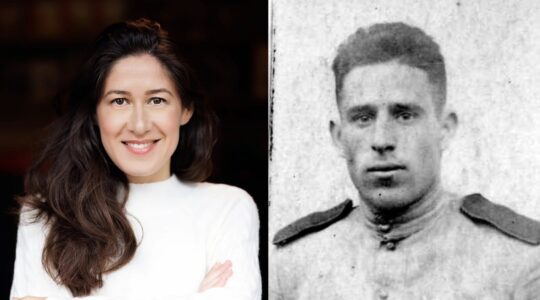Who’d have ever thought that the type of shoes one wears would become a dating issue for anyone but a foot fetishist?
But that’s what it has come to in the centrist Orthodox world, where pre-date interrogations of a young man or young woman’s rabbi and loved ones have become the norm. It’s part of the influence of the right wing on Modern Orthodoxy, say those involved.
Rabbi Moshe Tendler fields lots of calls from people checking out his students in the rabbinical school at Yeshiva University. He thought he’d heard everything (people asking if the boy wears a hat, which rabbi he consults for religious guidance and if his family is wealthy) Rabbi Tendler, a dean of the school, told listeners at a recent symposium on the shidduch (dating) crisis.
Then came the question that topped them all: Does the boy wear slip-on or tied shoes? Apparently the caller’s thinking was that loafers indicate someone too "modern" because lace-ups have long been part of the serious yeshiva student’s unofficial uniform.
"It has gotten out of hand," said Rabbi Tendler at the symposium organized by End The Madness, a new organization with a Web site (endthemadness.org) hoping to change the Orthodox dating culture.
"The emphasis on extraneous, inconsequential details have become a critical factor in deciding whether young people can meet," he said in an interview later. "The search for a mate has become more difficult than it should be."
End The Madness was born out of the dating experiences of Chananya Weissman, a 24-year-old YU rabbinical student.
"I have all the crazy stories like everyone else," Weissman said in an interview after the Feb. 26 gathering at YU, which attracted nearly 300 people.
"I dated a girl and it went well, so we decided to make a second date. But before the date, she called to cancel it because I don’t wear a hat when I daven. She said she didn’t mind but that her friends wouldn’t approve."
Common questions these days include: What dress size is her mother? (Her mother’s size is more indicative of how she’ll end up than her own size now, it’s thought.) What does her mother wear to the Shabbat dinner table (a dress or housecoat)? And do they cover their Shabbat tablecloth with plastic (apparently considered lowbrow)?
What counts about the guy? The size of his black hat and his rabbi.
"People ask long lists of questions, and if they get what they perceive to be a wrong answer to any one of them, then the whole thing is off," said Weissman.
And woe to the single person not raised religious. "Baal teshuvahs are usually dumped on," said Weissman. "They rarely get set up with people with good backgrounds."
Yet questions about character and life goals are almost never heard, said Rabbi Allen Schwartz of the Upper West Side’s Congregation Ohab Zedek. He has been asked, however, to which elementary school the date was planning to send his as-yet-unconceived children.
"Kids don’t have ‘normal’ ways to meet anymore," said Sandy Gross, a Teaneck mother of four young adults who spoke at last week’s symposium. "There used to be events where people could meet. I hear from the kids that if they go to these kinds of events, they’re not considered ‘serious people.’
"Kids really want to fit in, and the parameters of fitting in seem to be much more rigid" than they used to be, she said, when the norm for Modern Orthodox teens was to attend coed high schools, camps and youth groups.
"It’s time for these kids, these young adults, to grow up a little and think independently" about what’s going to help them find a mate, she said.
Weissman is trying to do just that.
"I just got set up recently by someone who knows us both," he said. "They started telling me this and that about her, but I stopped them and asked only if she’s normal or if she has crazy shtick.
"We’re going out tonight," he said. "Wish me luck."
The New York Jewish Week brings you the stories behind the headlines, keeping you connected to Jewish life in New York. Help sustain the reporting you trust by donating today.




